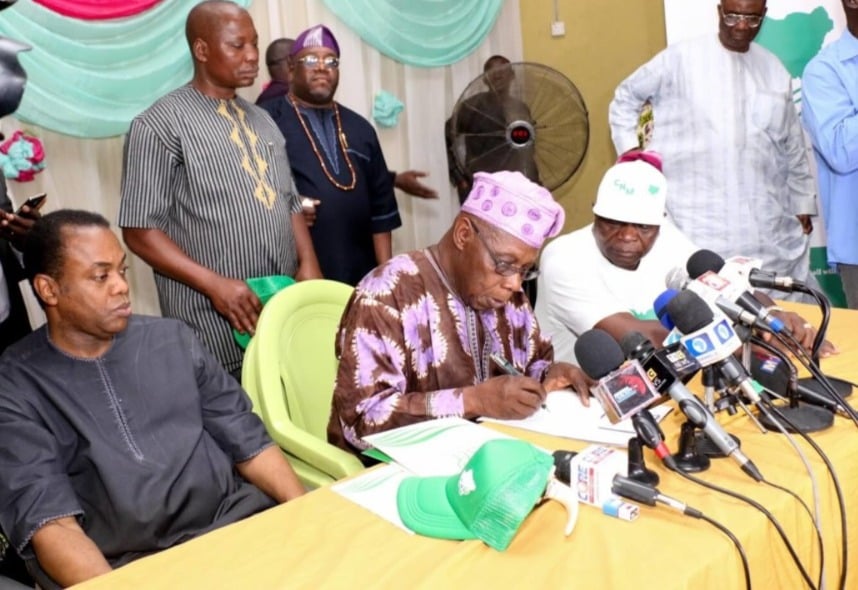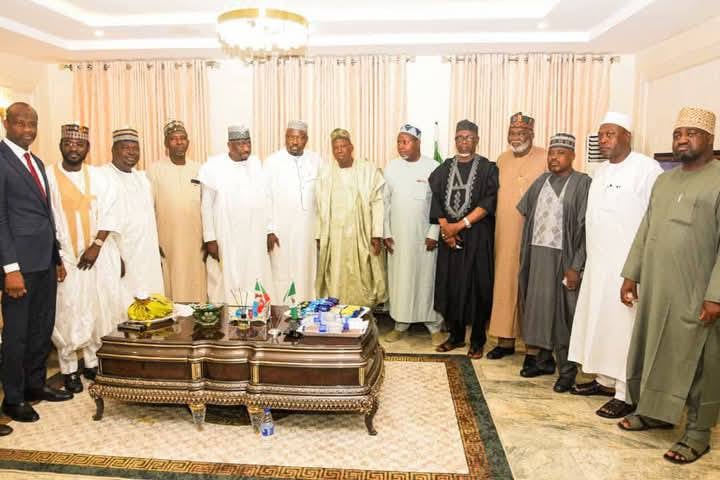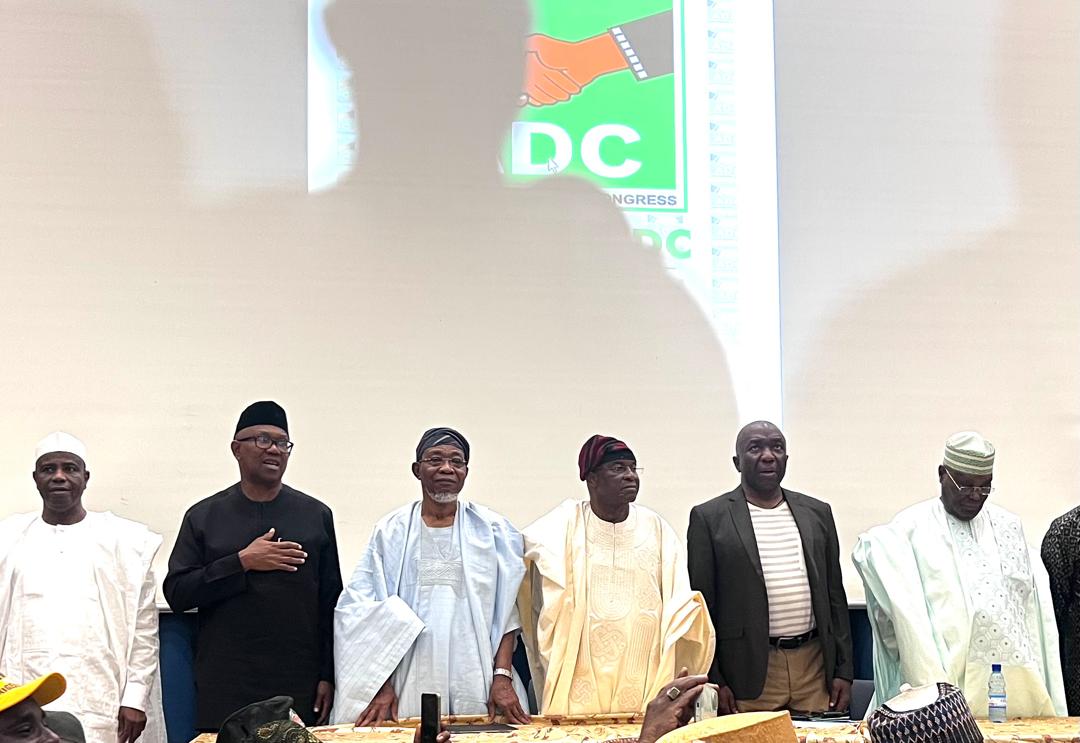ADC Coalition and Political Realignment for 2027 Elections

The Nigerian political landscape is undergoing a significant realignment as a coalition of opposition forces has formally adopted the African Democratic Congress (ADC) as their chosen platform to contest the 2027 general election and challenge the ruling All Progressives Congress (APC). This move comes in direct response to the APC's recent endorsement of President Bola Ahmed Tinubu as its sole candidate for the upcoming presidential poll.
The coalition, spearheaded by prominent political figures including the Peoples Democratic Party’s (PDP) candidate in the last election, Atiku Abubakar, the 2023 Labour Party (LP) presidential candidate, Peter Obi, and former governors such as Rotimi Amaechi, Rauf Aregbesola, and Nasir El-Rufai, aims to unseat President Tinubu. At the formal unveiling of the ADC, former Senate President David Mark was announced as the interim national chairman, with former Interior Minister Rauf Aregbesola appointed interim national secretary. Bolaji Abdullahi, a former Minister of Youth and Sports, was also introduced as the pro-tem national publicity secretary. The event, initially scheduled for the Wells Carlton Hotel, was moved to the Yar’adua Centre in Abuja following a reported cancellation of the booking.
Speaking after his unveiling, David Mark declared the coalition's mission as one to "rescue Nigeria from authoritarian drift" and prevent the nation's "descent into a one-party state." He accused the Tinubu administration of undermining democratic institutions and steering Nigeria towards a "creeping civilian dictatorship," lamenting the prevalent poverty, hunger, and insecurity, alongside what he described as a subjugated National Assembly. Mark asserted that the coalition chose the ADC after extensive consultations, aiming to transform it into a "fortress and platform of revived democracy," founded on the principles of rule of law, internal democracy, and inclusivity. He emphasized a commitment to national unity, transcending regional, age, and gender divides.
The outgoing ADC national chairman, Ralph Nwosu, echoed these sentiments, stating that Nigeria is currently in the "intensive care unit (ICU)" and expressed confidence that the ADC would lead the country out of its critical state. Nwosu revealed that the coalition-building efforts began 18 months prior, involving numerous meetings and consultations with stakeholders, including former Presidents Olusegun Obasanjo and Ibrahim Babangida. Veteran journalist Dele Momodu, publisher of Ovation magazine, publicly declared his support for the coalition, expressing delight at its launch and affirming his commitment to the ADC's mission to unseat the APC. Momodu, who revealed that secret meetings were held in London, Morocco, and Ghana to avoid sabotage, warned President Tinubu against endangering Nigeria's democracy for a second term, reminding him of his pro-democracy past. Veteran actor and lawyer, Kenneth Okonkwo, further predicted the "final downfall" of the APC, describing the ADC coalition as the "dawn of a new era" focused on the welfare of Nigerians and committed to preventing a fragmented opposition.
However, the ruling APC and the Presidency swiftly dismissed the new coalition. Bala Ibrahim, APC National Director of Publicity, labeled the coalition members as "analogue politicians" who pose "no threat" to the ruling party. Presidential spokesman Dr. Daniel Bwala similarly derided the coalition as "dead on arrival" and an "association of wild goose chasers" comprising "internally displaced politicians."
The Peoples Democratic Party (PDP) also reacted with skepticism and warnings. Acting National Chairman Ambassador Umar Damagum threatened disciplinary action against PDP members who joined the ADC-backed coalition, insisting the PDP remains united and will strengthen its structure for 2027. Chief Bode George, a former PDP deputy national chairman, described the coalition as divisive and a betrayal of the party's core principles, urging members to repair the PDP from within rather than abandoning it.
Notable figures who have openly cut ties with their former parties to join the ADC-led coalition include former Minister of Transportation Rotimi Amaechi and former Minister of Justice and Attorney General of the Federation Abubakar Malami (SAN). Amaechi announced his resignation from the APC, stating that Nigeria was "completely destroyed" and required a total overhaul. He accused the APC and INEC of electoral collusion and criticized the current administration for economic woes, hyperinflation, and the collapse of the Naira. Amaechi explicitly stated his long-held belief that Tinubu was "not material to govern the country" and called for a national movement rather than just a party change. Malami's statement cited "wide consultations and deep personal reflection" for his decision to quit the APC, describing the ADC as the "most viable platform" to save Nigeria from collapse due to insecurity and economic hardship.
Despite the optimism from within the coalition, Datti Baba-Ahmed, the 2023 Labour Party vice presidential candidate, offered a nuanced perspective on the challenges ahead. While supporting the principle of unity, he questioned the specific "honourable cause" driving the coalition, noting the inherent strangeness of the "strange bedfellows" involved. Baba-Ahmed acknowledged the success of past coalitions (like in 2015) but warned against underestimating President Tinubu, whom he described as a powerful strategist with decades of political planning. He highlighted the lack of a unifying figure akin to Muhammadu Buhari (who commanded a consistent voter base) or a long-term strategist like Tinubu himself within the current coalition. Baba-Ahmed stressed that success would require less individual ambition and more collective action, emphasizing the need for the coalition to address its structural issues and prioritize Nigeria's interest over personal candidacies.
The ADC's history as a coalition platform is not new. In May 2018, a movement led by former President Olusegun Obasanjo, the Coalition of Nigeria Movement (CNM), had adopted the ADC to challenge President Muhammadu Buhari in the 2019 elections. However, that fusion lasted only about three months before a faction pulled out due to disagreements over joining the Coalition of United Political Parties (CUPP). Despite that historical precedent, the current ADC coalition maintains its resolve, positioning itself as a robust organizational engine for the opposition ahead of 2027, unifying forces to prevent a fragmented challenge against the incumbent APC and offer alternative leadership to address Nigeria's pressing issues.








